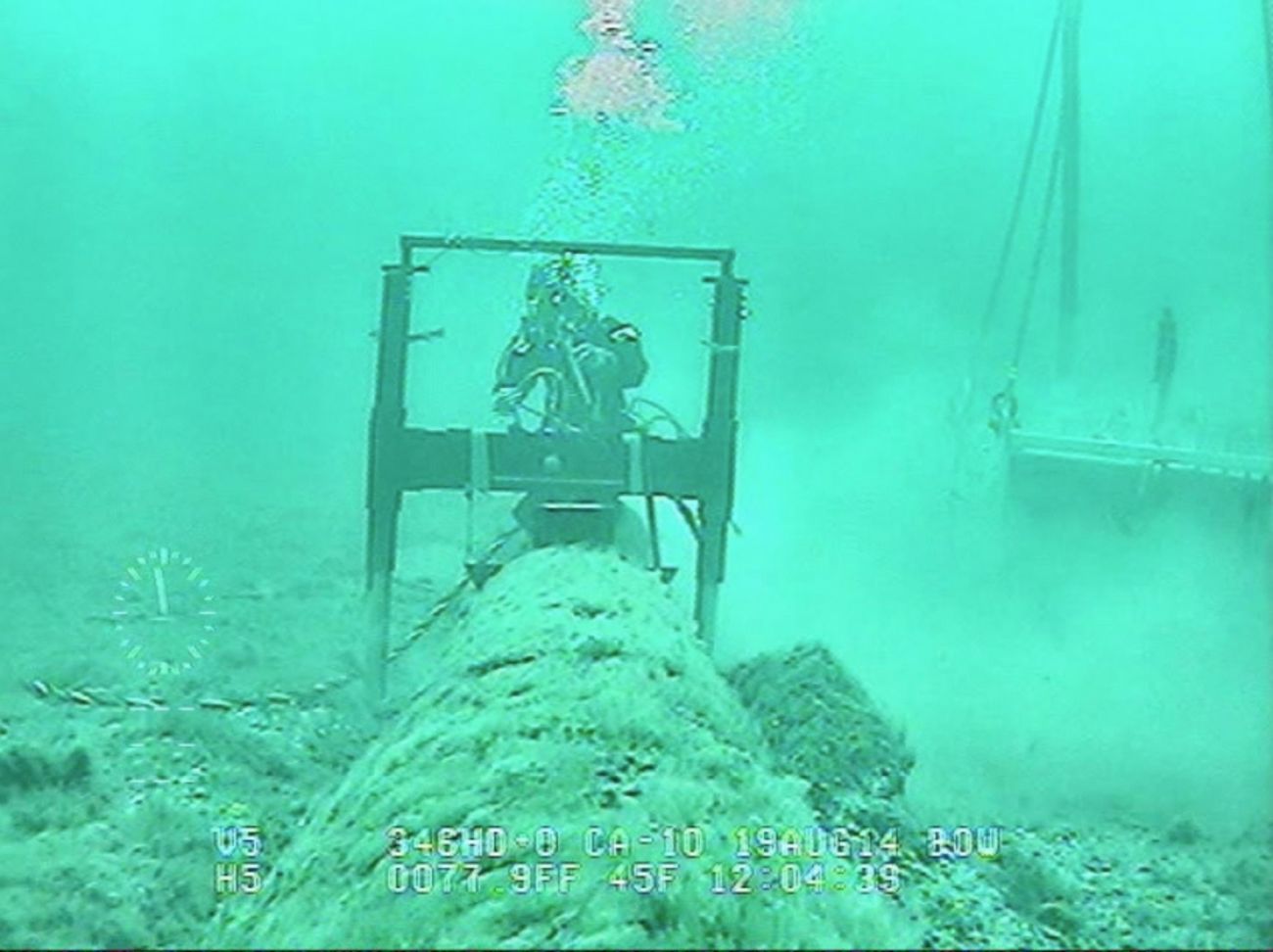Michigan grants Enbridge key permits to build Line 5 tunnel under Straits

Enbridge Energy is one step closer to building a tunnel to transport petroleum beneath the Straits of Mackinac, after Michigan environmental regulators approved key permits for the Line 5 project.
The decision by the Michigan Department of Environment, Great Lakes and Energy comes months after Gov. Gretchen Whitmer ordered the pipeline to shut down this May, underscoring the complicated road ahead for both Enbridge and its detractors in Michigan.
In an announcement Friday, state officials acknowledged wide-ranging public concerns about the tunnel, but said state law limited their nine-month review to a narrow question: Will the tunnel project comply with Michigan’s environmental laws ?
They concluded the answer is yes, and granted Enbridge permits to discharge wastewater into the Great Lakes and conduct its tunnel-building work in protected wetlands.
“Although this proposed tunnel project has illuminated numerous related policy issues, the basis for our decision is required to be limited to compliance with the relevant environmental statutes created by our legislature,” said Liesl Clark, director of the Michigan Department of Environment, Great Lakes and Energy, in a statement.
Environmentalists, tribal leaders and others who oppose the tunnel plan had urged the agency to go beyond a simple review of construction and operation impacts and consider broader questions impacts on Michigan’s environment, such as the climate implications of approving new fossil fuel infrastructure.
Related stories:
- What Michigan’s move to shut down Enbridge Line 5 means
- Whitmer orders Enbridge Line 5 shutdown, citing easement violations
- Enbridge sues Michigan over Line 5 shutdown order
- With Line 5 closure, a ‘game of chicken’ over how to heat Upper Peninsula
Sean McBrearty, coordinator of the anti-Line 5 coalition Oil & Water Don’t Mix, panned the decision as emblematic of a chronic refusal to regulate within EGLE.
“We had been encouraging them to turn the corner from the Snyder administration, when DEQ was an agency responsible for rubber stamping permits, to an agency that protects the Great Lakes,” McBrearty said. “They fell short of that today.”
The 68-year-old Line 5 pipeline, which currently lies exposed at the lakebottom as it transports petroleum products from Superior, Wisconsin to Sarnia, Ontario through the Straits of Mackinac, has long been a magnet for controversy. Fears that it could rupture and cause an oil spill in the Straits prompted Whitmer in November to order it shuttered by May. Enbridge is challenging that order in federal court.
In announcing the shutdown order, Whitmer’s office made clear that the governor’s opposition to the lakebottom line was a separate issue from the debate over the proposed tunnel.
The decision “does not prevent Enbridge from continuing to seek the necessary legal approvals to construct a tunnel,” a statement from Whitmer’s office noted at the time.
On Friday, Whitmer spokesperson Chelsea Parisio said EGLE’s decision “in no way lessens the pressing need for a shutdown of the existing pipelines by mid-May and Enbridge’s legal obligation to comply with that deadline.”
Attorney General Dana Nessel, who has vehemently opposed both the existing pipeline and the tunnel plan, said EGLE’s decision “is based on its obligations under state law” and has “no bearing” on her efforts.
Friday’s permit approval brings Enbridge one step closer to that goal. But the company must clear several more hurdles before beginning, including securing a federal Clean Water Act permit and gaining the Michigan Public Service Commission’s permission to move the pipeline inside the tunnel.
Enbridge and its supporters have lauded the $500 million tunnel plan, hatched in the waning days of former Gov. Rick Snyder’s administration, as the best option to eliminate the risk of an oil spill in the Straits, while allowing Enbridge to keep transporting petroleum across the state. Under the plan, the pipeline would pass between Michigan’s peninsulas in a concrete-lined tunnel deep beneath the lakebed.
“This project will make a safe pipeline even safer,” Enbridge spokesperson Ryan Duffy said in an emailed statement Friday.
Rich Study, president and CEO of the Michigan Chamber of Commerce, called the permit approvals a step toward ensuring that Line 5 continues to provide propane and natural gas to heat Michigan homes. Studley noted that Canadian public officials have urged Whitmer to drop her shutdown order, arguing that losing Line 5 would devastate their economy.
“We all want clean air and clean water, but all we have to do is look out the window today to see how important it is to have safe and clean and affordable energy,” Studley said.
Environmentalists, Native American tribes and others who oppose the planned tunnel argue it would not eliminate spill danger. They have also raised concerns about pollution during the tunnel-boring process, and warned that building new fossil fuel infrastructure will escalate the global climate crisis and undermine Gov. Gretchen Whitmer’s vow to make Michigan carbon neutral by 2050.
Tribal advocates, who had pressed EGLE to delay its decision until more is known about possible impacts on cultural resources, including possible Ice Age artifacts discovered in the Straits last fall, said they were dismayed by the decision.
“The only thing I can feel is extreme disappointment,” said Whitney Gravelle, attorney for the Bay Mills Indian Community. “... I would ask EGLE, did you really look ahead and make the best decision, not only for the state of Michigan, but for all of the people that rely on the Great Lakes for their livelihood?”
EGLE officials said they were legally bound to limit their review to questions of how the tunnel itself would impact water quality, wetlands and protected public uses of Michigan’s water.
“There is no statutory mechanism for EGLE to factor climate considerations into its review of these permits,” an agency FAQ document noted.
McBrearty rejected that explanation, arguing the agency “had everything they needed to deny these permits.” He said he remains confident that federal regulators, who are likely to conduct an exhaustive environmental review of the proposed tunnel, will deny the project.
Ultimately, state regulators determined that Enbridge’s tunnel would not significantly impair water quality and construction would impact just .13 acres of wetlands. EGLE has required Enbridge to offset wetland impacts by protecting 1.3 acres of existing wetland and purchasing mitigation credits.
An EarthJustice attorney representing the Bay Mills Indian Community said the tribe is reviewing its options after the department granted the permits without requiring a more robust review of potential impacts on Native American cultural resources.
Following the fall discovery of possible artifacts in the Straits, an archaeologist with the Michigan State Historic Preservation Office in November recommended that Enbridge hire a consultant to do further archaeological surveys of the Straits bottomland.
But Enbridge countered that new surveys aren’t necessary because the tunnel project will not disturb the bottomlands.
As a condition to the permit, EGLE has required Enbridge to avoid, minimize or mitigate any harm to artifacts. EGLE also imposed several other conditions on the permit to address water quality concerns.
Tunnel opponents said those conditions fall short, and slammed EGLE for basing its decision off “insufficient” data Enbridge submitted during the application process.
Enbridge’s history of failing to disclose safety concerns on Line 5 and defying state orders pertaining to the pipeline prove the company “does not have the interest of Michigan in mind,” said Beth Wallace, a Great Lakes partnerships manager for the National Wildlife Federation. “So why would we trust them to carry out a critical infrastructure project that blasts through the bottomlands of the Great Lakes?”
Enbridge still must secure a water discharge permit from the U.S. Army Corps of Engineers before it can begin constructing the tunnel, and EGLE spokesperson Scott Dean said the Corps’ review process will include a review of possible impacts on cultural artifacts.
On Wednesday, Army Corps regulatory project manager Katie Otanez said the agency is still reviewing more than 15,000 public comments, after which it will begin a lengthy review process. A decision on Enbridge’s federal permit application is still months if not more than a year away.
It’s not clear whether President Joe Biden’s Jan. 20 executive order on climate, which revived an Obama-era directive for federal agencies to consider climate impacts when conducting environmental reviews, could complicate Enbridge’s path to gaining Corps permits.
The Michigan Public Service Commission’s ongoing review is also expected to take more than a year. Line 5 opponents are pressing the commission to examine broader safety, economic, environmental and tribal concerns that EGLE did not consider in its permit review.
Michigan Environment Watch
Michigan Environment Watch examines how public policy, industry, and other factors interact with the state’s trove of natural resources.
- See full coverage
- Subscribe
- Share tips and questions with Bridge environment reporter Kelly House
Michigan Environment Watch is made possible by generous financial support from:
Our generous Environment Watch underwriters encourage Bridge Michigan readers to also support civic journalism by becoming Bridge members. Please consider joining today.
See what new members are saying about why they donated to Bridge Michigan:
- “In order for this information to be accurate and unbiased it must be underwritten by its readers, not by special interests.” - Larry S.
- “Not many other media sources report on the topics Bridge does.” - Susan B.
- “Your journalism is outstanding and rare these days.” - Mark S.
If you want to ensure the future of nonpartisan, nonprofit Michigan journalism, please become a member today. You, too, will be asked why you donated and maybe we'll feature your quote next time!






